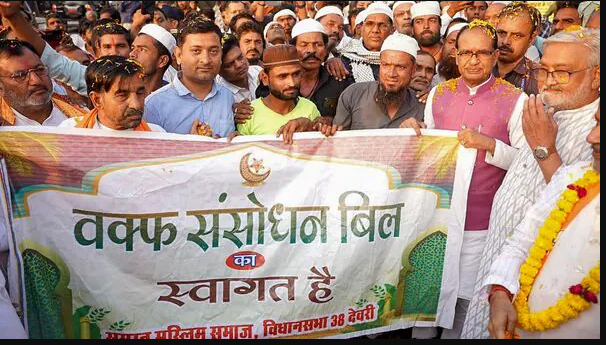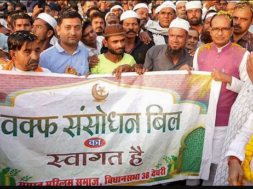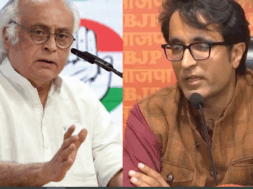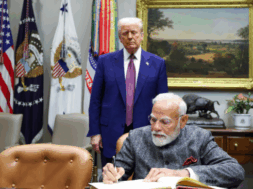
Manas Dasgupta
NEW DELHI, Apr 8: Even as Supreme Court is scheduled to hear on April 16 a clutch of petitions challenging the Waqf Amendment bill passed by parliament last week, the measure has come into force on Tuesday with the government issuing the necessary notification following the President’s assent.
Centre has reportedly filed a caveat in the Supreme Court, seeking hearing before orders are passed on pleas challenging validity of Waqf (Amendment) Act, 2025, which was heavily debated in Parliament before its passage in Lok Sabha and Rajya Sabha in the recently concluded Budget Session.
President Droupadi Murmu gave her assent to the bill on Saturday and the Waqf (Amendment) Act came into force from Tuesday, the government said in a notification. The Waqf (Amendment) Bill was approved by Parliament on Friday after the Rajya Sabha passed the legislation following a marathon 13-hour debate. Opposition parties strongly opposed the Bill, calling it “anti-Muslim” and “unconstitutional,” while the government defended it as a “historic reform” aimed at benefiting the minority community.
In addition, Parliament approved the Mussalman Wakf (Repeal) Bill. The Rajya Sabha gave its approval, while the Lok Sabha had already passed the Bill. As a result, the Mussalman Wakf Act, 1923, has now been repealed after the President gave her assent.
So far, 15 petitions have been filed on the contentious bill to which the Opposition and sections of the Muslim community had expressed multiple objections. Most of these were expressed during the marathon 12-plus hour debate on the bill in Lok Sabha and Rajya Sabha on Wednesday and Thursday last week. The bill has since been signed by the President and has come into force. The contentious provisions in the amended law include mandatory inclusion of two non-Muslim members in the Central Waqf Council and Waqf Boards.
Last week, Congress MP Mohammad Jawed and AIMIM president Asaduddin Owaisi moved the Supreme Court president challenging the constitutionality of the Waqf (Amendment) Bill.
Over 10 petitions, including those by politicians and the All India Muslim Personal Law Board and Jamiat Ulama-i-Hind, have been filed in the top court challenging the validity of the newly-enacted law. Jawed’s petition argued that the Bill imposed “arbitrary restrictions” on Waqf properties, undermining the religious autonomy of the Muslim community. He claimed that it discriminated against Muslims by imposing restrictions not present for other religious endowments.
Jawed, the MP from Kishanganj, Bihar, who was a member of the Joint Parliamentary Committee on the Bill, also contended that it introduced limitations on creating Waqfs based on religious practice duration. In a separate plea, Owaisi argued that the Bill stripped Waqfs of protections given to religious and charitable endowments of other religions, which he described as discriminatory and a violation of Articles 14 and 15 of the Constitution.
AAP MLA Amanatullah Khan has also approached the Supreme Court seeking the Bill’s declaration as unconstitutional, citing multiple violations of constitutional provisions including Articles 14, 15, 21, 25, 26, 29, 30, and 300-A.
The Association for the Protection of Civil Rights (APCR), an NGO, has also challenged the Bill’s constitutionality in the Supreme Court.
The Rashtriya Janata Dal (RJD) also said it is set to challenge the Waqf Amendment Bill in the Supreme Court, with Rajya Sabha MP Manoj Jha and party leader Fayaz Ahmed filing a petition on behalf of the party on Monday.
The government has repeatedly underscored that the law was about property and its management, not religion. The Waqf bill, the BJP had declared, was developed after consulting a large section of people and it has received the support of non-Muslim minorities. This, it insisted, is because of the largescale irregularities that did not allow Waqf property to benefit women and children, which the amended law would do. The huge lands and properties have been taken over by Waqf, aided by the Congress’s appeasement politics, it has alleged.
Speaking at the Rising Bharat Summit 2025 in Delhi on Tuesday, the Prime Minister Narendra Modi said the passage of Waqf Amendment Bill was a big step towards social justice. Citing delay in several crucial projects in previous governments, PM Modi also said “delay is the enemy of development.” “I inaugurated Pamban Bridge in Rameshwaram. Country waited for years for it but earlier governments did not build it. Previous governments delayed projects, we changed it… Delay is the enemy of development, we have taken vowed to defeat this enemy,” he said.













